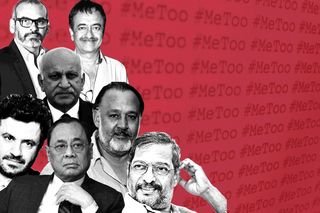
#MeToo One Year Later: Where Are All The Accused Men?
They’re enjoying their patriarchy-enabled, privileged lives free of any real, long-term consequences.

In 2006, Tarana Burke started the #MeToo movement, to address rampant sexual violence in her community against young women of color. But it was only in October 2017, when actress Alyssa Milano came across the hashtag and shared her own story of sexual harassment by media mogul Harvey Weinstein, that the #MeToo movement became a global phenomenon. Milano put out a public call to action to women, asking them to tweet about their own experiences with sexual harassment and assault.
The ripples were felt in India, especially after the then 24-year-old Raya Sarkar put out a List of Sexual Harassers in Academia (or LoSHA). She sourced stories from anonymous women who named men in academia, ultimately amassing 75 names from approximately 30 colleges and universities across India, UK and the US, HuffPost reported. The months after LoSHA was released, however, epitomize how the #MeToo movement has panned out — the women who accused men were at worst threatened with rape and murder, and at best simply not believed. ‘What about men?’ remains a common concern for doubters of #MeToo, with most people more concerned about false accusations and what that would do to men’s lives, than what has already been done to millions of women’s lives worldwide.
It was only one year later, in October 2018, that India’s #MeToo movement really picked up in stride. Mahima Kukreja’s tweet accusing All India Bakchod collaborator Utsav Chakraborty of sexual harassment set into motion an eight-month-long unraveling of AIB’s toxic culture of harassment that ultimately led to the disbanding of the organization. Soon after, it was not only sexual harassment and assault in academia that glared under the spotlight; women’s experiences across all media — comedy, advertising, Bollywood, journalism — came to light and launched India’s #MeToo movement into television screens, social media circles, and into worldwide renown.
October 2019 marks two years since #MeToo came to India, and one year since the conversation around #MeToo pervaded the mass cultural consciousness. As think pieces about whether #MeToo has worked or not abound, let’s look at some of the most high-profile #MeToo cases in India, and what the accused men are up to now:
M.J. Akbar, BJP MP and former Union Minister
In 1993, Priya Ramani was a 23-year-old journalist starting out in her career when she met former Union Minister M.J. Akbar, who used to be an editor at the Asian Age, and 20 years older than her. Ramani said she was applying for a job, and Akbar was conducting her interview … in a hotel room, which she found odd at the time but did not have the confidence to challenge. In the room, the bed looked like it was ready to be slept in. She also added Akbar did not ask her any pertinent job-related questions during the interview but instead enquired after her marital and relationship status.
Soon after, she said, he began to sing Hindi songs, signal to her to join him on a two-seater sofa by his bed, and have a drink with him. Uncomfortable and suspicious, Ramani left the room and quit the interview, only to write about parts of this experience in an open letter published in Vogue in 2017. Bolstered by the #MeToo movement, and by other women’s accounts with Akbar alleging similar incidents — from meeting young women in bathrobes to raping a woman — she named him in a tweet in 2018.
After she did, a number of women came forward publicly with their own stories of harassment and assault at Akbar’s hands — journalist Pallavi Gogoi wrote “I was raped by M.J. Akbar” in a Washington Post piece; Ghazala Wahab detailed Akbar’s sexual assault on her in The Wire, and many other women spoke out on social media thanking Ramani.
Details of Ramani’s interaction with Akbar were provided by Ramani in court testimony, as reported by The Wire, as she is currently battling a defamation case Akbar slapped on her, for outing him as an alleged harasser. Ramani has pleaded not guilty. In court, she said the allegations she made came at “great personal cost” to her — she has tolerated rape and death threats on social media — and that she had “nothing to gain” from doing so. Referencing the emotional toll of suffering harassment from Akbar, and having to deal with the defamation suit, Ramani added, “A predator is more powerful than his prey.”
Akbar tendered his resignation to the Union cabinet 10 days after Ramani accused him publicly, stating he would “challenge the allegations from a personal capacity.”
Nana Patekar, Bollywood actor
In one of the first high-profile instances of #MeToo in Bollywood, actress Tanushree Dutta spoke out last year and accused veteran actor Nana Patekar of sexual harassment while both of them were filming Horn OK Please in 2008. Dutta said she had spoken up at the time, too, but her complaints were ignored. Her account was corroborated by others who worked on the set, all of whom joined Dutta in filing a police complaint against Patekar.
In June, the Mumbai Police dismissed Dutta’s case, saying they hadn’t found any evidence against Patekar. Dutta has said the police failed to interview all witnesses in the case, that there were fake witnesses who opposed her story, and that witnesses have been “have been silenced by intimidation,” The Wire reported. Dutta has since vowed to challenge the closure report and has urged the police to open another investigation.
In Patekar’s fan circles, and among #MeToo doubters, Dutta became a joke. When the police couldn’t find any evidence, people believed Patekar was given a “clean chit,” The Wire reported. In Dutta’s case, however, the lawyers clarified that not being able to find evidence meant only that; it did not mean Patekar was ruled innocent by a judge. While Dutta’s case did not cause the stir or outrage it should have — a majority of reactions to it instilled doubts within people’s minds regarding #MeToo — it did shed light upon the ways in which our criminal justice system is unprepared and ill-equipped to deal with #MeToo cases.
Since then, Patekar has reportedly landed a lead role in a high-budget spy-thriller movie directed by Jayam Ravi and co-starring Taapsee Pannu.
Alok Nath, Bollywood actor
On October 8, 2018, writer-director Vinita Nanda, in a detailed Facebook post, described how veteran actor Alok Nath had allegedly raped her multiple times, 19 years ago.
“He was an alcoholic, shameless and obnoxious but he was also the television star of that decade, so not only was he forgiven for all his bad behavior but many of the guys would egg him on to be his worst,” she wrote. She proceeded to detail the night when Nath allegedly took advantage of her intoxication and raped her in her home, and once more when she said she was coaxed into sex by Nath because she didn’t want to lose her job as a writer on a show Nath was acting in.
Following the social media post, Nanda filed an official complaint with the police on October 17, 2018. Following suit, actress Sandhya Mridul and Deepika Amin both said Nath had harassed them.
Related on The Swaddle:
Why Women Make Anonymous #MeToo Accusations — And Why We Have to Believe Them
In January 2019, Nath was granted anticipatory bail — he wasn’t arrested, but if he were, he would be released on bail — and a Mumbai sessions court cast aspersions on Nanda’s account by saying Nath may have been falsely accused by her, The Wire reported. The judge had said, as reported by Hindustan Times, Nanda “remember(ed) the entire incident but she did not remember the date and month of the incident. In view of all these facts, the possibility cannot be ruled out that (Nath) has falsely been enroped in the crime,” that she could have delayed lodging the complaint for “her own benefit,” and that “if there is a delay in lodging the FIR, it loses the advantage of spontaneity, danger creeps in of the introduction of colored version, exaggerated account or concocted story as a result of large number of consultations/deliberation (sic).” Nath’s legal counsel held that Nanda lied a) because she had a personal vendetta against him, or b) she was in deep, unrequited love for him.
Since the allegations came out, Alok Nath has had one blockbuster film released with co-stars Ajay Devgn, Tabu, Jimmy Shergill and Javed Jaffrey, De De Pyaar De. Another film of his, Main Bhi (Me Too), in which Nath plays a judge dealing with sexual harassment cases, has been struggling to find a distributor, the film’s producer told India Today. He has also slapped a defamation suit on Nanda.
Rajkumar Hirani, Bollywood movie director
In a HuffPost India article, a woman who worked on Rajkumar Hirani’s film Sanju, said the director sexually harassed and assaulted her for six months during the film’s shoot. The woman sent an email detailing the incidents to Hirani’s co-producer Vidhu Vinod Chopra and his wife Anupama Chopra. She told HuffPost India she was intimidated by Hirani and had gone to great lengths to conceal his actions and pretend like everything was normal — she couldn’t afford to lose the job since she had to support her father, who was suffering from a terminal illness.
“I had no choice but to be polite to him,” the woman told HuffPost India. “It was unbearable but the reason I endured it all, until I couldn’t, was because I didn’t want my job to be taken away from me, and work to be questioned. Ever … I was worried that if I left midway, it would be impossible to find another job in this industry if he were to speak badly about my work. Because if Hirani said I wasn’t good, everybody would listen. My future would be in jeopardy,” she added.
Responding to the allegations, Hirani’s lawyer told HuffPost India, “At the outset, our client states that the allegations made against him are false, mischievous, scandalous, motivated and defamatory.”
The Chopras had promised at the time to offer their full support to the woman, set up an internal committee to investigate her accusation, and in the meantime, dropped Hirani’s name from the poster and trailer of an upcoming film at the time, Ek Ladki Ko Dekha Toh Aisa Laga. Hirani has since said his relationship with Chopra was “crumbling” under the pressure; no updates about the internal committee that was supposedly set up have been given publicly.
In September, Hirani was awarded the ‘Best Director in the Last 20 Years’ by IIFA; famed actors such as Sanjay Dutt and Ranbir Kapoor have praised him publicly. Rumors about Hirani’s next projects have also made the rounds in the last month, with reports asserting he is set to make his next blockbuster with the likes of Shah Rukh Khan and Ranbir Kapoor.
Vikas Bahl, Bollywood movie director
Vikas Bahl, a Bollywood film director and co-founder of now-defunct Phantom Films was accused of sexual harassment by a former Phantom employee last year. Following the accusation, Bahl was removed as director from Hrithik Roshan-starrer Super 30. Phantom Films was disbanded, and Bahl filed lawsuits against his co-founders Vikramaditya Motwane and Anurag Kashyap.
An internal inquiry conducted by Reliance Entertainment (which has a 50% stake in Phantom) gave him a clean chit, Mumbai Mirror reported. Following the clean chit, Bahl’s name was reinstated among the film’s credits. The process of investigating the accusation, however, occurred without the participation of the complainant. “Despite repeated reminders, the complainant did not appear before the committee. Those associated with the complainant and the respondent were interviewed by the committee. It also recorded documentation and correspondence between the two and based on this, it has unanimously concluded that Vikas Bahl is exonerated of all charges leveled against him.”
An investigation of this exoneration process carried out by HuffPost India, however, showed Reliance Entertainment “exonerated him without following established procedures, interviewing all possible witnesses, or assessing all available evidence.” HuffPost found the timing of the inquiry suspect — as it was carried out right before the release of Super 30, and its verdict was given in haste.
“The manner in which they were handling the situation, and that too after four years, was something that left me unsettled,” said the complainant, whose testimony had formed the basis of HuffPost India’s article. “So I was not surprised by the outcome. However, that doesn’t change my truth. He knows what he did and he will have to live with it.”
Currently, Bahl enjoys full support from Reliance Entertainment and the clean chit they gave him. With Super 30 under his belt, he is set to move forward in his career to make more films unencumbered, leaving behind the inconsequential #MeToo blip. Bahl’s accuser, in October 2018, dropped the case against the director, saying, “I have had enough and I am still suffering at the hands of this man even after three years. I do not want to be involved in litigation so [I] will not file an affidavit.”
Subodh Gupta, artist
In December 2018, an Instagram account called Scene and Herd posted numerous allegations by anonymous women against big names in the Indian art world. One of them was by young female staffers alleging sexual misconduct against artist Subodh Gupta; they said he was a “serial sexual harasser.” In October 2019, Gupta slapped a Rs. 5 crore case against the Instagram account, alleging malice and defamation.
In November, a Delhi High Court, in a move that rocked free speech advocates in India, ordered Instagram to reveal the identity of the user that operates the Scene and Herd account. The same court ordered Facebook and Google to remove posts that detail the allegations. Any move to reach out to or help those who accused Gupta has not been publicized by the government.
Comedians Utsav Chakraborty, Tanmay Bhatt, Gursimran Khamba and All India Bakchod
One of the most pivotal moments of the #MeToo movement was Mahima Kukreja’s accusation of sexual harassment against writer/comedian Utsav Chakraborty, which set into motion a months-long process that ultimately led to the undoing of comedy collective All India Bakchod.
Kukreja tweeted that Chakraborty had sent her unsolicited photos of his penis, which prompted Chakraborty to apologize on Twitter. This led to the revelation that AIB’s chief, Tanmay Bhat, had knowledge of detailed, specific allegations against Chakraborty and still continued to work with him. Sexual harassment allegations against AIB co-founder Gursimran Khamba also emerged at the time. Eight months later, AIB had fired its staff, stopped making content and disbanded. Bhat was fired from comedy talent show Comicstaan, and On-Air With AIB was canceled.
For almost a year, the men maintained their silence. Now, they’re back. Bhat is often seen commenting on the now up-and-running AIB Instagram account and even receives invites to speak at gaming conventions. The comedy community seems to have rallied behind him. Chakraborty has said he is broke, has no money for therapy, and that the media greatly exaggerated what went down during #MeToo. Gursimran Khamba has now launched his own comedy consultancy, Light@27, and from his Instagram, it seems he is still performing at public comedy gigs around India.
Related on The Swaddle:
The Vicious Cycle of Sexism in the Indian Court System
Ranjan Gogoi, Chief Justice of India
On April 19, a former junior court assistant who worked for India’s Chief Justice Ranjan Gogoi sent an affidavit to 22 judges accusing the CJI of sexual harassment. A day later, a special three-judge bench held an impromptu hearing to address her statement; it was bizarrely headed by the accused himself. The Supreme Court then began an internal investigation into the woman’s claims. Almost two weeks later, the woman said she would exit the probe because she did not expect any justice from the judiciary, Reuters reported.
The 35-year-old woman expressed disappointment with the evaluation process, saying she wasn’t allowed to have her lawyer with her in the proceedings, despite feeling anxiety and having difficulty hearing; she noticed there was no audio or video recording made of her statements, Reuters reported.
“I found the atmosphere of the committee very frightening and I was very nervous because of being confronted and questioned by three Supreme Court Judges and without even the presence of my lawyer/support person,” Reuters reported her saying. “I felt I was not likely to get justice from this committee and so I am no longer participating in the 3-Judge Committee proceedings.”
Soon after, an internal Supreme Court inquiry gave a clean chit to its Chief Justice, which led to nationwide protests, which, while unable to bring about change, were instrumental in bringing the all too pervasive issue of sexual harassment to light. This case felt like the culmination of the #MeToo movement that steamrolled through Indian media — the ultimate example of a man with power abusing it and being allowed by society to feel righteous about it. It also felt like the culmination of the backlash to the movement that had been brewing for some time, which focused on protecting the accused against potentially false charges.
This plays out the same way in almost all sexual harassment or assault cases: the person reporting the harassment is made to feel crazy, their motives are called into question; they are stripped of dignity and made vulnerable to threats. Meanwhile, the accused is allowed to participate in the determination of their guilt.
There have been no consequences for Gogoi, who remains the Chief Justice of India, until his predetermined retirement date, November 17, 2019. Gogoi has said there is a conspiracy against him, concocted by the woman. An investigation of this claim by Justice AJ Pattnaik revealed inconclusive proof, which a highly placed source in the judiciary has insisted, doesn’t mean a “clean chit” to the woman, The Quint reported.
*
Yes, #MeToo was cathartic. For women and everyone else who accused those in power, of sexual harassment and assault, in an emboldened collectivized state, #MeToo was necessary. But the sheer force of that power also got people’s backs up (especially powerful men’s) who never had to live in a reality most women live with every day — one wherein the threat of sexual harassment or assault is ever-present and the knowledge that safety isn’t a guarantee is all too well-known. It’s also apparent in their efforts to get back to normal — efforts I wouldn’t say were difficult to make, or that were met with many obstacles. From Bahl getting to call an internal committee to assess his conduct so it could exonerate him, to Gogoi presiding over proceedings that would determine his own guilt or innocence, to Akbar, Nath and Gupta fighting back with the power of the law behind them (a law woefully ill-equipped to provide justice to accusers), it’s increasingly clear who has the power in #MeToo — not the hundreds of thousands of women, but the select few they accused.
It’s been a year since #MeToo, and these men are coming back out of the woodwork — if they were ever pushed into it in the first place. They are being welcomed with open arms, by an audience more concerned with men’s rehabilitation than the mental and physical health of the women who accused the men.
Sure, #MeToo was successful in that it shed light upon the millions of exhausting everyday accounts of sexual harassment and assault — but it was only the first step. Awareness can’t accomplish much if it is not followed up with actual policy changes and long-lasting consequences for those accused of wrongdoing. For these men, their patriarchy-enabled lives have given them a respite, a get-out-of-jail-free pass, if you will. It’s time their monopoly over justice and fairness is revoked.
Rajvi Desai is The Swaddle's Culture Editor. After graduating from NYU as a Journalism and Politics major, she covered breaking news and politics in New York City, and dabbled in design and entertainment journalism. Back in the homeland, she's interested in tackling beauty, sports, politics and human rights in her gender-focused writing, while also co-managing The Swaddle Team's podcast, Respectfully Disagree.
Related


The Pros and Cons of Having a Work Spouse
